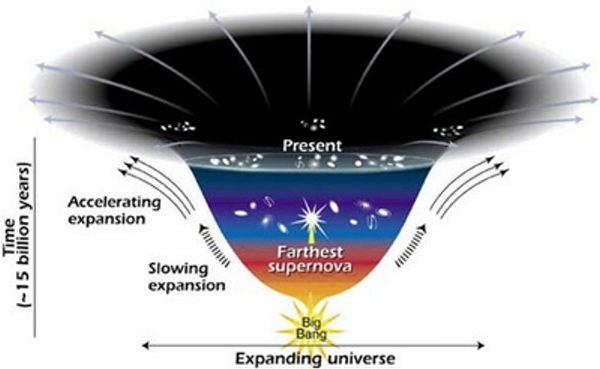Universe Today | Steve Nerlich | 2011 Sept 03
Cosmologists tend not to get all that excited about the universe being 74% dark energy and 26% conventional energy and matter (albeit most of the matter is dark and mysterious as well). Instead they get excited about the fact that the density of dark energy is of the same order of magnitude as that more conventional remainder.
After all, it is quite conceivable that the density of dark energy might be ten, one hundred or even one thousand times more (or less) than the remainder. But nope, it seems it’s about three times as much – which is less than ten and more than one, meaning that the two parts are of the same order of magnitude. And given the various uncertainties and error bars involved, you might even say the density of dark energy and of the more conventional remainder are roughly equivalent. This is what is known as the cosmic coincidence.
To a cosmologist, particularly a philosophically-inclined cosmologist, this coincidence is intriguing and raises all sorts of ideas about why it is so. However, Lineweaver and Egan suggest this is actually the natural experience of any intelligent beings/observers across the universe, since their evolution will always roughly align with the point in time at which the cosmic coincidence is achieved.
A current view of the universe describes its development through the following steps:And here we are. Lineweaver and Egan propose that it is unlikely that any intelligent life could have evolved in the universe much earlier than now (give or take a couple of billion years) since you need to progressively cycle through the star formation and destruction of Population III, II and then I stars to fill the universe with sufficient ‘metals’ to allow planets with evolutionary ecosystems to develop.
- Inflationary era – a huge whoomp of volume growth driven by something or other. This is a very quick era lasting from 10-35 to 10-32 of the first second after the Big Bang.
- Radiation dominated era – the universe continues expanding, but at a less furious rate. Its contents cools as their density declines. Hadrons begin to cool out from hot quark-gluon soup while dark matter forms out of whatever it forms out of – all steadily adding matter to the universe, although radiation still dominates. This era lasts for maybe 50,000 years.
- Matter dominated era – this era begins when the density of matter exceeds the density of radiation and continues through to the release of the cosmic microwave background radiation at 380,000 years, when the first atoms formed – and then continues on for a further 5 billion years. Throughout this era, the energy/matter density of the whole universe continues to gravitationally restrain the rate of expansion of the universe, even though expansion does continue.
- Cosmological constant dominated era – from 5 billion years to now (13.7 billion) and presumably for all of hereafter, the energy/matter density of the universe is so diluted that it begins losing its capacity to restrain the expansion of universe – which hence accelerates. Empty voids of space grow ever larger between local clusters of gravitationally-concentrated matter.
So any intelligent observer in this universe is likely to find the same data which underlie the phenomenon we call the cosmological coincidence. Whether any aliens describe their finding as a ‘coincidence’ may depend upon what mathematical model they have developed to formulate the cosmos. It’s unlikely to be the same one we are currently running with – full of baffling ‘dark’ components, notably a mysterious energy that behaves nothing like energy.
It might be enough for them to note that their observations have been taken at a time when the universe’s contents no longer have sufficient density to restrain the universe’s inherent tendency to expand – and so it expands at a steadily increasing rate.
The Cosmic Coincidence as a Temporal Selection Effect Produced by the Age Distribution of Terrestrial Planets in the Universe - CH Lineweaver, CA Egan
- Astrophysical Journal 671(1) 853 (2007 Dec 10) DOI: 10.1086/522197
arXiv.org > astro-ph > arXiv:astro-ph/0703429 > 16 Mar 2007
<< Previous

